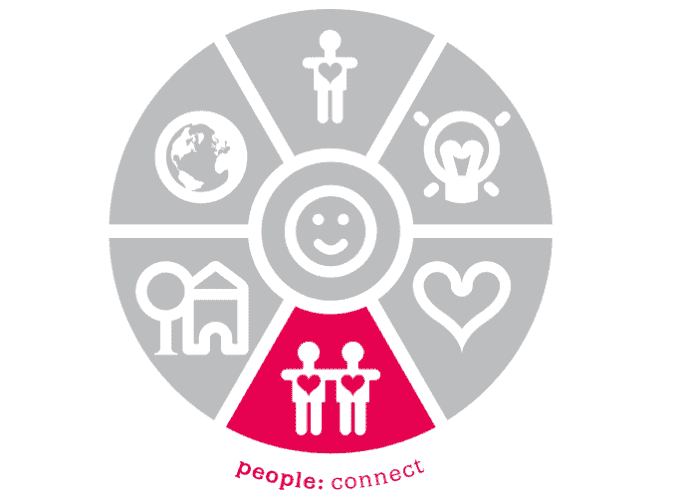The challenge of connecting while social distancing

How many times have we heard the phrase “we are all in this together” recently? Perhaps it’s starting to wear a little thin, but before you roll your eyes, consider this: we really do need each other to survive.
Social evolution
We evolved in tribes of 50 to 250, and in days gone by exclusion from the group significantly reduced our chances of survival. Evolution has hardwired us to need social connections, and according to one of the world’s longest studies into happiness and health, this is still true today.
Robert Waldinger, the current study director and professor at Harvard University says “the surprising finding is that our relationships and how happy we are in our relationships has a powerful influence over our health.”
Connecting while social distancing
So, what does that mean, as we all do our bit to flatten the COVID-19 curve by ‘social distancing’?
Some of us may be home alone and feeling isolated, while others are struggling to get used to spending so much time with partners, children or flatmates. Whichever it is, social isolation does not need to mean that we are lonely or disconnected, but it probably does mean that we have to work a little harder to connect.
The quality and strength of our relationships are directly linked to the amount of time that we invest in them. Relationships are a bit like bank accounts, we need to make regular deposits, in this case through positive interactions.
A 2016 Mental Health Foundation report examining the nature of relationships in the 21st Century highlights:
“As a society and as individuals, we must urgently prioritise investing in building and maintaining good relationships and tackling barriers to forming them. Failing to do so is equivalent to turning a blind eye to the impact of smoking and obesity on our health and wellbeing.”
Successful connections: the magic number
According to Dr. John Gottman, the ratio of positive to negative interactions in a relationship should be five to one. Yes, that right 5:1, so it’s time to start seriously investing in our nearest and dearest!
Certainly, social isolation can make us feel lonelier, but it also has the potential to strengthen our connections as COVID-19 helps bring into focus what, and who, is really important in our lives.
Get social
The great news is, people around the world are coming up with some amazing ideas to stay connected while still physically isolating. Like these…
- Hold a Dinner in the Driveway. Enjoy a convo’ with the neighbours while the kids play 1.5 metre hopscotch on the footpaths!
- Feeling energetic? Try a dance party! Show your neighbours how to bust a move and start a neighbourhood movement. Dancing isn’t just a great way to stay fit, it has proven mental health and wellbeing benefits.
- City slicker? Spark a nationwide concert from your balcony! Italians did just this, singing and playing instruments from their balconies, alley ways and roof tops in unison creating not only music across neighbourhoods, but connections.
- Too ‘out there’ for you? How about an online book club or a good read?
- For a little screen time magic, a Netflix party with friends allows you to catch your favourite shows or movies and spoil the plot/interrupt with annoying questions/post flick analyse wherever your mates are.
Watch this: This amazing couch choir will lift your spirits and inspire you to connect to others with their Close to You rendition.
Your challenge!
Make time to invest in your relationships – they are the cornerstone of your wellbeing. Take your pick from these great activities over the next week to help you build stronger relationships and connections. We dare you…!
- Reconnect to connect: Call someone you haven’t spoken to for a long time and check in on how they are.
- Put up lots of pictures of friends and family in places where you are going to catch sight of them regularly.
- Set up a ‘virtual’ games night with friends and family.
Be safe, be well and be kind.
Need help?
- If you are experiencing a mental health crisis call Lifeline Australia on 13 11 14 or MensLine on 1300 99 78 99.
- For a list of national helplines and websites visit Beyond Blue
- If you are concerned about the health and safety of yourself, family or friends, you can find government advice on Coronavirus and a 24 hour government help line for Coronavirus at 1800 020 080.
- And here for more information on Financial Support
This blog is adapted from a Supporting Project of WoW, Mentally Healthy City Townsville, supported by the Queensland Mental Health Commission. Word document + study attribution and further resource materials are available on request. Contact Tony Coggins, Lead Associate Population Mental Health, Implemental (formerly Maudsley International) and WoW educator on wow@implemental.org for more information.
Wheel of Well-being is owned by South London and Maudsley NHS Foundation Trust (SLaM) and is licensed under a Creative Commons Attribution Non-Commercial Share-Alike 4.0 International License. Information on this license is available at www.creativecommons.org/licenses/by-nc-sa/4.0.